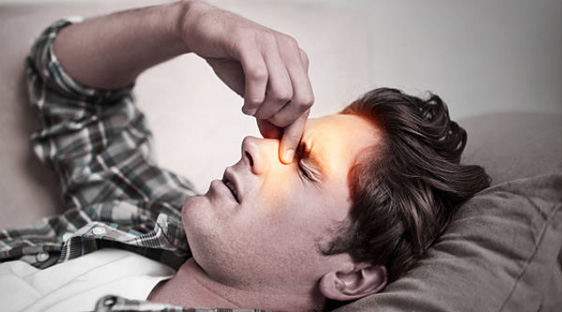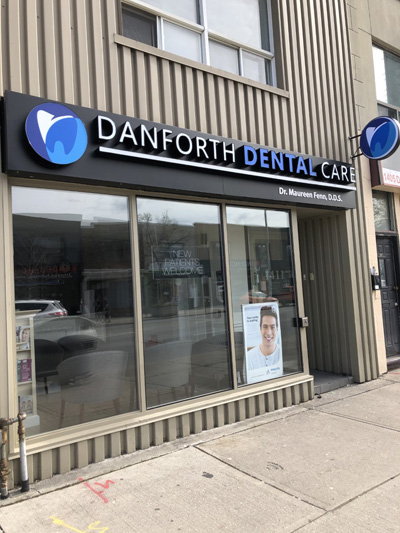Can Nasal Congestion and Sinus Problems Cause Sleep Apnea?
Here’s what our Danforth dentist wants you to know about the sleep apnea/ sinusitis connection.
Sleep apnea occurs when the muscles in the back of the throat relax. This sleep disorder affects the breathing, leading to a repeated stopping and starting during the course of sleep.
There are three main forms of sleep apnea: the most common being obstructive sleep apnea, involving the relaxing of the throat muscles; central sleep apnea, where the brain fails to send the right signals to the muscles; and finally, complex sleep apnea, which combines both obstructive sleep apnea and central sleep apnea. And, it’s worth mentioning that sleep apnea can be potentially dangerous if not treated.
Potential risk factors of sleep apnea
While sleep apnea can affect anyone of any age, there are several risk factors that are known to potentially increase a person’s risk.
The risk factors for obstructive sleep apnea include being overweight, having a larger neck circumference, having a narrower throat/airway, having a family history of sleep apnea, being male, being older, regularly using alcohol and/or other substances like sedatives or tranquilizers, and/or regularly smoking.
And, last but not least: nasal congestion and sinus problems can also be a risk factor for sleep apnea - which is what we’re going to talk more about in this article.
Sleep apnea and sinusitis/nasal issues
While sleep apnea is a condition that blocks the throat, sinusitis blocks the nasal passages through causing the tissue lining in the sinuses to become swollen and inflamed. Common symptoms of sinusitis include persistent coughing (generally worse at night), nasal congestion, headaches, jaw aching, fatigue, ear pressure, and others.
Both a sleep apnea and sinusitis condition can lead to loud and disruptive snoring thought the night, as they both involve some of the same anatomical areas. Since the sinus inflammation associated with sinusitis will force sleepers to breathe through their mouth instead of their nose, going against our bodies’ natural reflex - mouth breathing becomes the only method left. And, when there’s tissue in the way of the airway, snoring results.
While sinusitis and sleep apnea do share similarities, a study published in Scientific Reports concludes that the correlation between these two conditions are not exactly clear or particularly strong. In the study, researchers followed 971 participants who had sleep apnea, and 4,855 who did not, over 5 years. They discovered that less than 7% of participants with sleep apnea were then later diagnosed with sinusitis, and of those with sleep apnea, only 2% went on to also developed sinusitis.
In conclusion, to have sleep apnea does not mean that you will also develop sinusitis, and vice versa.
However, there is a minimal increase in the risk that a person with sleep apnea will also have sinusitis. Furthermore, since the symptoms of sinusitis make it more of a challenge to breathe during sleep, a person diagnosed with chronic sinusitis who does not seek treatment will be more prone to developing a sleep apnea condition.
So, sleep apnea that is associated with chronic sinusitis can be more effectively treated provided that the sinusitis is treated first.
Fortunately, sinusitis can be successfully treated with the use of antibiotics in most cases, or in some cases, the condition will go away on its own. But, sleep apnea will require ongoing treatment such as with the use of a CPAP (Continuous Positive Airway Pressure) device, which is a mask that is worn over the nose and/or mouth during sleep to assist in keeping the airway open by gently blowing air.
On the other hand, if a person’s sleep apnea condition is more mild to moderate, treatment with a dental appliance for sleep apnea can work successfully by helping to comfortably hold the lower jaw in protrusive positioning during sleep, aiding in keeping the airway open. And fortunately, this sleep apnea oral device for snoring is proudly offered by our Toronto dentist. Even severe sleep apnea patients can be treated with an oral device if they can't tolerate a CPAP.
Ready to address your sleep apnea or snoring problem today?
Contact our Danforth dental clinic to schedule a sleep apnea oral appliance consultation with our wonderful Dr. Maureen Fenn.


We are conveniently located near Greektown on the TTC Danforth Avenue subway line between Greenwood Avenue and Coxwell Avenue.
1411 Danforth Avenue, Toronto, ON M4J 1N2